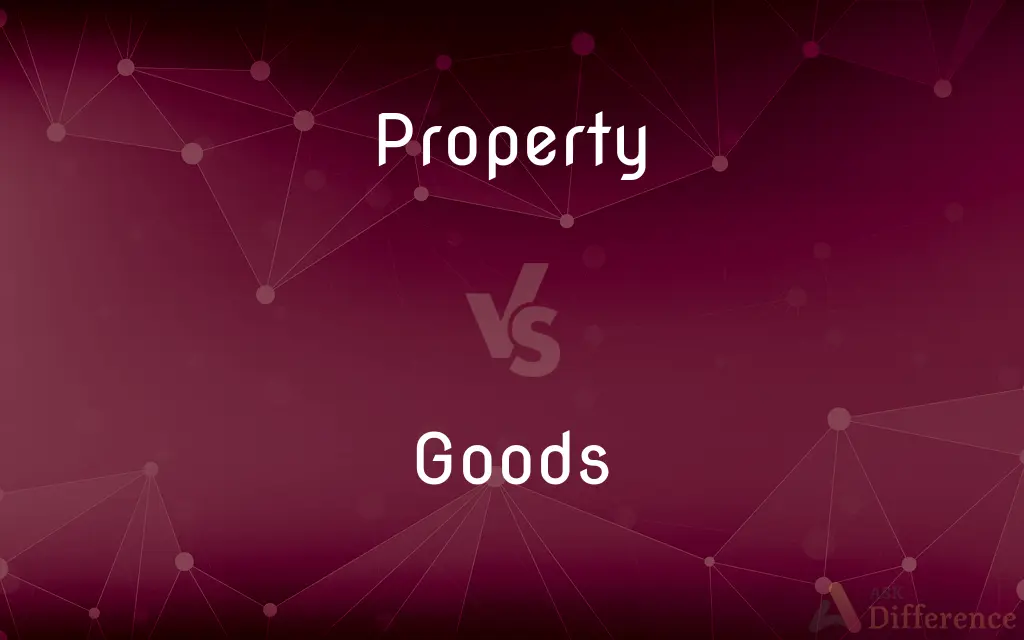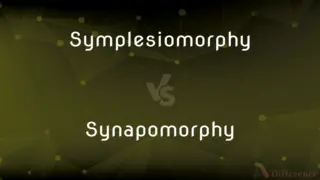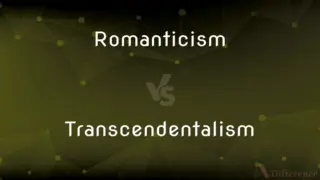Property vs. Goods — What's the Difference?
Edited by Tayyaba Rehman — By Maham Liaqat — Updated on March 6, 2024
Property is a broad term encompassing all legal rights over resources, whereas goods refer specifically to tangible, movable items owned by someone.

Difference Between Property and Goods
Table of Contents
ADVERTISEMENT
Key Differences
Property encompasses a wide range of legal rights over resources, including both tangible and intangible assets. It represents ownership that can be exercised over something, which could be as diverse as real estate, intellectual property, or personal belongings. Whereas goods specifically refer to tangible, movable items that are owned by someone. This distinction highlights the broader nature of property as a concept, covering more than just physical items.
Property rights include the ability to use, sell, lease, or give away the asset, encompassing a broad spectrum of legal entitlements. These rights can apply to a variety of assets, demonstrating the concept’s versatility. On the other hand, goods are typically considered in the context of commerce or personal ownership, focusing on physical items that can be transferred from one person to another. This perspective narrows the scope of goods to objects that hold economic value and can be physically handled.
The term property can also refer to real property, which means real estate or land, highlighting the diversity within the category of property itself. This form of property is distinct in its immovability and the extensive legal frameworks governing its ownership and transfer. Whereas goods, being movable, are subject to somewhat different legal rules, particularly those concerning possession, transfer, and the rights of buyers and sellers in commercial transactions.
Another subcategory of property, includes copyrights, patents, trademarks, and trade secrets, representing ownership over creations of the mind. These intangible assets are protected by law to encourage innovation and creativity. Goods, by their nature, do not encompass such intangible assets but are the physical embodiments that might result from intellectual property, such as books, technology devices, or branded products.
Both property and goods are subject to legal protection, but the nature of that protection and the rights afforded to the owner can vary significantly. Property laws are designed to ensure the secure ownership and transfer of both tangible and intangible assets, providing a framework for resolving disputes. Goods, being a subset of personal property, are primarily protected under laws that govern sales, commerce, and consumer protection, emphasizing the transactional nature of goods.
ADVERTISEMENT
Comparison Chart
Definition
Broad term for legal rights over resources.
Tangible, movable items owned by someone.
Types
Includes real property, personal property, and intellectual property.
Primarily personal property that is movable.
Nature
Can be tangible or intangible.
Always tangible.
Legal Protection
Encompasses laws on ownership, transfer, and use.
Governed by sales, commerce, and consumer protection laws.
Examples
Land, buildings, patents, trademarks.
Furniture, cars, electronics.
Compare with Definitions
Property
Legal rights over resources.
She has property rights over the intellectual property she created.
Goods
Objects of commerce or personal ownership.
He packed his goods before moving to the new house.
Property
Broad category including tangible and intangible assets.
His property includes both a house and several patents.
Goods
Economic value and physical handling.
The company’s goods are distributed worldwide.
Property
Rights to use, sell, or lease assets.
The company’s property encompasses a variety of assets across the country.
Goods
Physical items that can be transferred.
The shipment of goods arrived at the port yesterday.
Property
Encompasses real and personal property.
Their property investments include both commercial real estate and stocks.
Goods
Tangible, movable items owned.
The store sells goods ranging from clothing to electronics.
Property
Includes intellectual property.
The artist retained property rights to her music, including recordings and compositions.
Goods
Subset of personal property.
The auction will feature luxury goods including jewelry and art.
Property
Property (Latin: Res Privata) in the abstract is what belongs to or with something, whether as an attribute or as a component of said thing. In the context of this article, it is one or more components (rather than attributes), whether physical or incorporeal, of a person's estate; or so belonging to, as in being owned by, a person or jointly a group of people or a legal entity like a corporation or even a society.
Goods
In economics, goods are items that satisfy human wants and provide utility, for example, to a consumer making a purchase of a satisfying product. A common distinction is made between goods which are transferable, and services, which are not transferable.A good is an "economic good" if it is useful to people but scarce in relation to its demand so that human effort is required to obtain it.
Property
Something owned; a possession.
Property
A piece of real estate
Has a swimming pool on the property.
Property
To invest which properties, or qualities.
Property
To make a property of; to appropriate.
They have here propertied me.
Property
Any area set aside for a particular purpose;
Who owns this place?
The president was concerned about the property across from the White House
Property
A construct whereby objects or individuals can be distinguished;
Self-confidence is not an endearing property
Common Curiosities
What is the key difference between property and goods?
Property is a broad term that includes rights over tangible and intangible resources, while goods specifically refer to tangible, movable items.
Can goods be considered property?
Yes, goods are a type of property, specifically personal property that is tangible and movable.
What is personal property?
Personal property includes movable items, both goods (tangible) and intangible assets like stocks and bonds.
Are digital products considered goods or property?
Digital products are considered a form of intellectual property due to their intangible nature, rather than goods.
Is real estate classified as goods?
No, real estate is considered real property, not goods, because it is immovable.
What types of property exist?
Property types include real property (real estate), personal property (tangible items), and intellectual property (intangible creations of the mind).
How are goods and property protected by law?
Property laws protect rights of ownership, use, and transfer, while goods are specifically protected under laws related to commerce, sales, and consumer rights.
How do consumer protection laws relate to goods?
Consumer protection laws ensure that the goods sold meet certain safety and quality standards and protect the rights of consumers.
Why is intellectual property important?
Intellectual property protects creations of the mind, encouraging innovation and creativity by granting creators rights over their work.
Can the ownership of goods and property be transferred in the same way?
While both can be transferred, the process and legal implications may differ, especially between tangible goods and intangible property.
What makes real property unique from other types of property?
Real property is unique due to its immovability and the complex legal frameworks governing its ownership and transfer.
Can services be considered goods?
No, services are actions or activities provided to others and are not tangible, hence not classified as goods.
Do goods always have economic value?
Yes, goods typically have economic value as they can be sold or traded.
How does the transfer of intellectual property differ from goods?
The transfer of intellectual property involves rights over intangible creations and requires specific agreements, unlike the physical transfer of goods.
What role does ownership play in defining property and goods?
Ownership is central to both, determining the legal rights held over a resource (property) or a tangible item (goods).
Share Your Discovery

Previous Comparison
Symplesiomorphy vs. Synapomorphy
Next Comparison
Romanticism vs. TranscendentalismAuthor Spotlight
Written by
Maham LiaqatEdited by
Tayyaba RehmanTayyaba Rehman is a distinguished writer, currently serving as a primary contributor to askdifference.com. As a researcher in semantics and etymology, Tayyaba's passion for the complexity of languages and their distinctions has found a perfect home on the platform. Tayyaba delves into the intricacies of language, distinguishing between commonly confused words and phrases, thereby providing clarity for readers worldwide.













































